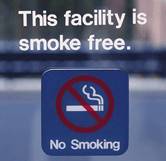Southern States Lagging in Tough Smoking Bans, CDC Says
Only 6 in 10 Americans covered by state or local laws banning smoking in public places.
Smokers in southern states can still find plenty of places to spread secondhand smoke to others, a new report finds.

In fact, no states in the U.S. Southeast have comprehensive smoke-free laws to protect nonsmokers from tobacco fumes, a federal government report says.
This type of law bans smoking in all indoor areas of workplaces, restaurants and bars.
"We've made great progress in protecting many Americans from secondhand smoke exposure," expert said, "but millions of Americans, especially those living in southeastern states, are still unprotected from this completely preventable health hazard."
The number of states with comprehensive smoke-free laws rose from zero in 2000 to 26 by 2010, including the District of Columbia. But progress has stalled: Only two more states were added to that list between 2010 and 2016, the CDC noted.
"The lack of comprehensive statewide smoke-free laws in some U.S. states represents a key policy failure," added expert.
But progress has been made. Overall, the CDC report finds that nearly 60 percent of Americans are covered by comprehensive smoke-free laws at the state or local level, compared with less than 3 percent in 2000.
Local anti-smoking laws also protect some residents living in 14 of the 23 states without comprehensive smoke-free laws. However, nine states have no such laws at either the local or state level, and eight states even forbid local officials from passing smoke-free laws, the CDC researchers said.
Local anti-smoking regulations also vary widely in the 14 states without comprehensive smoke-free laws, the report found. For example, local laws protect 60 percent of people in West Virginia. In Kentucky, South Carolina and Texas smoking laws cover about 30 percent of people. However, only 2.4 percent of people in Georgia, and less than 1 percent of people in Arkansas and Wyoming are protected by smoking laws, the findings showed.
"Ten years ago, the Surgeon General concluded there is no risk-free level of secondhand smoke exposure," expert noted.
Exposure to secondhand smoke causes heart disease and lung cancer. Together, the two diseases kill more than 41,000 nonsmokers every year in the United States. Even brief exposure to secondhand smoke is a health threat, and completely eliminating indoor smoking is the only way to fully protect nonsmokers, according to the CDC.
"Smoke-free laws provide a low-cost, high-impact benefit to the public's health," said expert.
"These laws substantially improve indoor air quality, help smokers quit, prevent youth and young adults from starting to smoke, change social norms about the acceptability of smoking, and reduce heart attack and asthma hospitalizations among non-smokers," expert explained.
The CDC also noted that smoke-free laws can be extended to other types of tobacco products, such as e-cigarettes. Currently, seven states -- California, Delaware, Hawaii, New Jersey, North Dakota, Oregon and Utah -- include e-cigarettes in their comprehensive smoke-free laws.
Source: HealthDay News
- 305 reads
Human Rights
Fostering a More Humane World: The 28th Eurasian Economic Summi

Conscience, Hope, and Action: Keys to Global Peace and Sustainability

Ringing FOWPAL’s Peace Bell for the World:Nobel Peace Prize Laureates’ Visions and Actions

Protecting the World’s Cultural Diversity for a Sustainable Future

Puppet Show I International Friendship Day 2020

